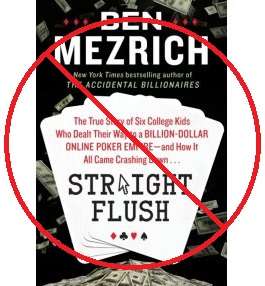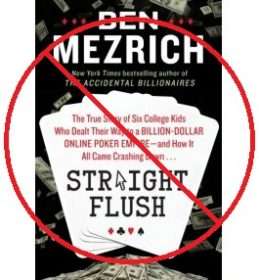Ben Mezrich’s “Straight Flush” Literary Fraud, Part 2: The Imperative Blackjack Omission
 Of all the underlying themes in Ben Mezrich’s new narrative non-fiction book, Straight Flush, none are more important than its insistence that the University of Montana SAE frat boys who founded Absolute Poker were idealistic, pure-hearted dreamers whose love of poker — and poker only — was the company’s sole purpose and guiding light.
Of all the underlying themes in Ben Mezrich’s new narrative non-fiction book, Straight Flush, none are more important than its insistence that the University of Montana SAE frat boys who founded Absolute Poker were idealistic, pure-hearted dreamers whose love of poker — and poker only — was the company’s sole purpose and guiding light.
It’s an important fallacy to propagate. The book as a whole doesn’t work unless Mezrich can portray Scott Tom and the rest of the boys as innocent victims of circumstance and the US government.
Time after time, Straight Flush bombards the reader with examples of just how pure its founders were, from its philosophical focus on poker’s aspects of a game of skill, to the boys choosing not to do business with certain Costa Rican sports bookies after encountering blatant evidence that those bookies were mobbed up, to Tom’s parting admonition that “he truly believed, in his heart, that he was innocent.”
And in all of Straight Flush‘s 304 pages, the word “blackjack” never appears in the form of a game, though “blackjack table” or “blackjack chips” (as a background object) appears five times as a story prop. (Hat tip to Poker Grump for the clarification). “Blackjack” alone, as a game or concept? Nada. That’s a couple of times less than the number of appearances for “amazonian,” if memory serves, which provides more evidence of where this book is aimed.
Did you know that Absolute Poker offered blackjack to its customers, well before the passage of the 2006 Unlawful Internet Gambling Enforcement Act (UIGEA)? You won’t find that out from Mezrich in this book, and that omission is an unfair exploitation of the reader’s expectations that a “true story” actually be true. Ben Mezrich is guilty of countless lies by omission in this book, and this is one of the largest.
Here’s how it all went down. In October of 2005, PartyPoker introduced blackjack at its poker tables. Players could switch from poker to blackjack with a single mouseclick from any poker table, via a stylized “21” icon in the table’s upper corner. The introduction of blackjack was an instant success, quickly adding to a revenue gain published by PartyGaming in quarterly revenue reports that December.
Behind-the-scenes tales, shared by Party execs at the many trade conferences that poker-room execs attended, asserted that the company quickly began generating as much as $800,000 a day in profits from its new blackjack offerings, and the AP fratboys wanted a piece of that action.
Thus started a heated debate on the Absolute Poker board of directors, this not too long after the “graying up” of the board mentioned in Straight Flush that involved the stepping aside of co-founder Garin Gustafson.
The battle, as relayed to me by two separate AP board members — one of whom was Phil Tom himself — quickly became a battle of young versus old. The fratboys, in particular Scott Tom and Hilt Tatum IV, had dollar signs in their eyes and wanted that blackjack added as soon as possible, to the point of having CJ and Christian and the South Korean programmers working on the new gaming addition.
The older board members, who included Phil Tom and AP’s most prominent player rep, Mark Seif (who is himself a lawyer), argued that introducing blackjack brought them directly into the crosshairs of many United States anti-gambling laws.
This had nothing to do with the “poker is a game of skill” legal fallacy that wasn’t even discussed back in 2005, nor did it have anything to do with the 1961 Wire Act; instead, it had to do with the three-pronged test of “gambling” activity that has been an accepted court standard in most US jurisdictions for decades.
One of the three prongs necessary to meet most courts’ definition of gambling was the placing of a wager (the offering of consideration) with the house, with wins or losses then determined by the outcome of some later event — the turn of a card, roll of a die, spin of a wheel or outcome of a game.
The legal defense of online poker, as it was championed at the time, was that poker sites were not engaging in gambling because they were offering a service. The rake was the fee for that service, and whether poker was gambling or not, that didn’t matter, as it was a wager occurring between the players themselves.
This “poker as a skill game” stuff? It’s revisionist history. Back then, it wasn’t even on the table.
Blackjack changed the equation, because regardless of whether any skill was involved, players were clearly wagering against the house. That’s the barrier that PartyPoker willfully breached, which it then compounded by rolling out is full suite of casino games, PartyCasino, in early 2006. For a brief time, those were open to US players as well.
Absolute Poker and the SAE fratboys wanted to emulate PartyPoker, because Party was the market leader. In the boardroom struggle, they eventually got their way, and in early 2006 AP added live blackjack to its offerings — and as with Party’s, it was playable right from the poker client.
Blackjack? Readers don’t find that concept anywhere in Straight Flush. Instead, they get the tale of how these idealistic boys just needed to get their third year of audited financial results on the books, in order to launch that planned IPO and get closer to those “billionaire” dreams.
Absolute Poker’s rollout of blackjack in late 2005 and early 2006 was exactly during the time the company made its IPO plans, and was, in fact, a vital part of it — a chance to quickly add more paper valuation to the company’s bulging bottom line.
However, given that it was the frat boys themselves that wanted the blackjack added, against the advice of older board members and legal opinions alike, makes a giant lie of the whole pure-hearted poker theme that drives Mezrich’s tale. And so, — poof! — blackjack had to be left out. It fit neither the historical rewriting that the SAE fratboys seek, nor the tale that Mezrich wanted to sell.
Tales like this work best with a kicker. Readers might remember that Mezrich garnered literary note for his first book, Bringing Down the House, which was the augmented and romanticized retelling of the ’80s-era MIT blackjack teams. (Mezrich’s fictionalizing of the events in BDTH was so extreme it remains the primary focus of the Wiki page on the book.)
The point is, Mezrich knows all about blackjack, including its historical role and its defined role as gambling. Recognizing this, it’s then easy to see why no whiff of blackjack could be allowed anywhere near the fantasy Mezrich constructs in Straight Flush.
The omission of blackjack is a lie of omission so large, so grandiose, that it makes the book itself fraudulent. Still, if you’re going to lie, make it big. Ben Mezrich has the literary lie down pat.


















You devote 4 full paragraphs to telling us that the “game of skill” argument never existed and was never brought up in 2005 or before. Oh, so totally not true. That argument has been made and remade for decades, and there were definitely discussions about online poker and whether laws against gambling truly were applicable.
Here is one article from 2005: http://www.gambling-law-us.com/Articles-Notes/online-poker-skill.htm and the most interesting paragraph from it mentions case law from 1993:
The authors also cite 1993 Colo. Op. Att’y Gen. No. 93-5 (April 21, 1993) for
the proposition that in Colorado poker is a game of skill, at least insofar as the
office of the Colorado Attorney General is concerned. That Opinion dealt with
whether the Colorado legislature had the power to authorize certain games in
view of the prohibition in the Colorado Constitution against lotteries. In dicta,
the then Attorney General, after analyzing the predominance test said “poker is
probably not a lottery because skill plays a larger, perhaps dominant role.”
That observation was not crucial to the outcome of the opinion, and is certainly
not supported by any case law. The opinion cites Morrow v. State, 511 P.2d 127
(Alaska, 1973) for an analysis of the elements to be considered in determining
when skill predominates over chance.
There were common discussions on 2+2 and in the hallways during the WSOP as to what argument would best stand up in court. The “game of skill” argument was most definitely around long before you think it was.
One can argue which theory predominated at any given time, but the many possible ways online poker could be squeezed through the cracks to legality have been discussed for a long, long time. “Game of skill” was one of those theories and it was most certainly “on the table” in 2005. The Wire Transfer Act applying only to sports and horses was another. 3-pronged test was another.
Nick, thanks for your comments. “Poker as a skill game” arguments date back to at least 1980 and the landmark USA v. Billy Baxter case, which I’ve written about for close to a decade. But that is an exception to a general rule, with Baxter himself defined as a professional player in that case’s findings.
No one is arguing that poker isn’t or shouldn’t be defined as a game of skill; we’re all on the same page on that. What I’m telling you and the other readers is that no US laws have ever treated it as such, and the whole argument in the book is a giant red herring being served up to pretend that it was being discussed as such back then.
Whether or not poker has been defined as gambling — with legal definitions on both poker and gambling varying from state to state — poker has always been treated as gambling, and the focus on the three-pronged gambling definition was always the overriding legal concern.
The argument about poker being a game of skill had zero legal relevancy in the time frame these issues were purportedly being discussed; in terms of whether the product Absolute Poker was legal in the US as then understood, it mattered not one whit. The Baxter case was an exceptional circumstance, and it wasn’t until such time as the PPA took the “skill” mantra and began arguing it in cases such as in South Carolina, Colorado and New York that it actually became a point of legal debate. That was circa 2007-11, not sooner.
The Wire Act had somewhat more importance, but all the online poker businesses that chose to service the US simply said it didn’t apply to them and moved on from there. Had this book challenged the Wire Act stance, it would have been on sounder footing, but instead Mezrich chose the spurious “skill” argument in the overriding attempt to ennoble the frat boys.